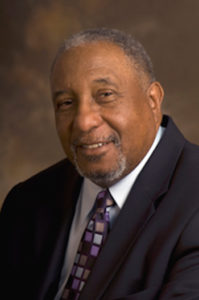
Bernard Lafayeette
*Bernard Lafayette was born on this date in 1940. He is a Black activist and organizer.
Bernard Lafayette Jr. was born and raised in Tampa, Florida. His parents were Bernard Lafayette, Sr., and Verdell Lafayette. He was the eldest of eight children of a low-income family, so Bernard started working odd jobs to gain more income by the age of 11. His jobs included cashiering, meat cutting, delivering produce, and collecting change at a coffee shop. Despite being black in the South, he went to an integrated Elementary School and eventually began to go to schools that were still segregated.
At twenty, Lafayette moved to Nashville, Tennessee, and enrolled in the American Baptist Theological Seminary. During his first year, he took classes in nonviolence at the Highlander Folk School run by Myles Horton and attended many meetings promoting nonviolence. He learned more about the philosophy of nonviolence as lived by Mohandas Gandhi while taking seminars from activist James Lawson Jr. Lafayette began to use nonviolent techniques as he became more exposed to the substantial racial injustice of the South. In 1959, he, along with Diane Nash, James Bevel, and John Lewis, all members of the Nashville Student Movement, led sit-ins at restaurants and businesses that practiced segregation.
As an advocate of nonviolence, in 1960, Lafayette assisted in the formation of the Student Nonviolent Coordinating Committee (SNCC). In 1961, the Congress of Racial Equality (CORE) initiated the Freedom Rides. Lafayette wanted to participate, but his parents forbade him. After the Freedom Riders were violently attacked in Anniston, Alabama, the Nashville Student Movement, of which Lafayette was a member, vowed to take over the journey; these Nashville students were determined to finish the job. In May 1961, in Montgomery, Alabama, Lafayette and the other riders were "greeted" at the bus terminal by Ku Klux Klan chapter members and were viciously attacked. The Freedom Riders were brutally beaten, and William Barbee and John Lewis were beaten until they fell unconscious. Lafayette, Fred Leonard, and Allen Cason narrowly escaped being killed by jumping over a wall and running to the post office.
Lafayette and other Riders were arrested in Jackson, Mississippi, and jailed at Parchman State Prison Farm in June 1961. During Lafayette's participation in civil rights activities, he was beaten and arrested 27 times. In the summer of 1962, Lafayette accepted a position with the Student Nonviolent Coordinating Committee (SNCC) to organize work in Selma, Alabama, alongside his then-wife, Colia Liddell Lafayette. Upon arriving in the city, he began leading meetings at which he spoke about the condition of African Americans in the South and encouraged local African Americans to share their experiences. On June 12, 1963 (the same night that Medgar Evers was murdered in Mississippi), Lafayette was severely beaten by a white assailant. While badly injured, he was not deterred from continuing his work.
In late 1964, the Southern Christian Leadership Conference (SCLC) board decided to join the ongoing Alabama Project and chose Selma as the focal point to gain voting rights for African Americans. In early 1965, they organized a series of public demonstrations that, finally, with the march from Selma to Montgomery initiated by Bevel, put enough pressure on the federal government to take action and gave enough support to President Lyndon to demand the drafting and passage of the Voting Rights Act of 1965. Lafayette went on to work on the 1966 Chicago Open Housing Movement. He later became ordained as a Baptist minister and served as president of the American Baptist Theological Seminary. He was married to Kate Bulls Lafayette in 1969. They had two children together, Bernard and James.
In 1973, Lafayette was named the first director of the Peace Education Program at Gustavus Adolphus College, Saint Peter, Minnesota. The Gustavus program enabled Lafayette to infuse the entire college curriculum with peace education. Lafayette served this Lutheran liberal arts college for nearly three years. Following Selma, Bernard wrote several books about his experiences in the civil rights movement and his views on nonviolence. These books include "The Leaders Manual: A Structured Guide and Introduction to Kingian Nonviolence," "The Briefing Booklet: An Orientation to the Kingian Nonviolence Conflict Reconciliation Program," and "In Peace and Freedom: My Journey in Selma."
Lafayette has been recognized as a significant authority on strategies for nonviolent social change. He is a Distinguished Scholar-in-Residence at the Candler School of Theology at Emory University in Atlanta, Georgia. Lafayette received a Doctor of Humane Letters from Mount Holyoke College in 2012. In 2014, the University of Rhode Island honored Lafayette with an honorary doctorate for his lifetime of nonviolent civil and human rights leadership.